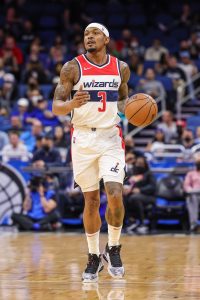Entering the 2022/23 league year, it had been four years since any NBA player had an explicit no-trade clause in his contract, but the Wizards ended that streak by awarding Bradley Beal a no-trade clause as part of his new five-year, maximum-salary deal.
 No-trade clauses are rare in the NBA, and had become even rarer in recent years. Beal is just the 10th player in NBA history to receive one.
No-trade clauses are rare in the NBA, and had become even rarer in recent years. Beal is just the 10th player in NBA history to receive one.
To be eligible to negotiate a no-trade clause, a player must have at least eight years of NBA experience and has to have spent at least four years (albeit not necessarily the most recent four years) with his current team. Even if a player qualifies, his team is typically unlikely to restrict its flexibility by including a no-trade clause in his deal.
While Beal is the only NBA player with an explicit no-trade clause in his contract at the moment, there are several who will have the ability to veto trades in 2022/23.
A player who re-signs with his previous team on a one-year contract – or a two-year deal with an option year – is given no-trade protection. That group doesn’t include players on two-way contracts, but it does include players who accept standard (non two-way) one-year qualifying offers.
A player who signs an offer sheet and has that offer matched by his previous team also has the ability to veto a trade for a full calendar year.
With those criteria in mind, here are the players who must give their consent if their teams want to trade them during the ’22/23 league year:
No-trade clauses:
- Bradley Beal (Wizards)
Players whose offer sheets were matched:
- Deandre Ayton (Suns)
Players re-signing for one year (or two years, with a second-year player/team option):
- Ryan Arcidiacono (Knicks): Traded
- Bismack Biyombo (Suns)
- Jevon Carter (Bucks)
- Kessler Edwards (Nets): Traded
- Drew Eubanks (Trail Blazers)
- James Harden (Sixers)
- Udonis Haslem (Heat)
- Serge Ibaka (Bucks): Traded
- Andre Iguodala (Warriors)
- Derrick Jones (Bulls)
- Nathan Knight (Timberwolves)
- Wesley Matthews (Bucks)
- Rodney McGruder (Pistons)
- Mike Muscala (Thunder): Traded
- Victor Oladipo (Heat)
- Theo Pinson (Mavericks)
If any player who re-signed for one year approves a trade during the 2022/23 league year, he’ll have Non-Bird rights at season’s end instead of Early Bird or full Bird rights.
The only player with veto rights who consented to a trade during the 2021/22 season was forward Solomon Hill — he signed off on a deal that sent him from the Hawks to the Knicks. Hill had suffered a torn hamstring prior to that trade and knew he’d likely be waived soon by one team or another, so vetoing the deal in an effort to retain his Early Bird rights with Atlanta would’ve been futile.
Any player who approves a trade will retain his veto ability on his new team, and would have to consent to any subsequent deal during the 2022/23 season.

Can Harden still veto a trade once he’s exercised his option?
Ah, never mind, I see he’s not on the list of 23-24 players who can veto trades. I guess once he opts in it’s a 2 year contract.